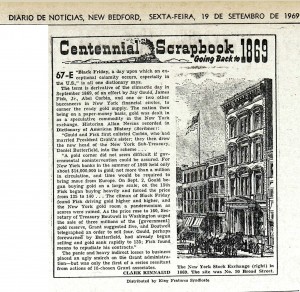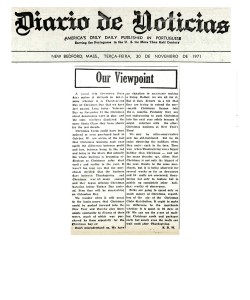
‘Black Friday’ the term used to describe the day after Thanksgiving, nowadays characterized by crowds ascending upon retailers to buy consumer products at large discounts. Yet, the origins of both the term are unclear, and it only began to be commonly used by advertisers in specific reference to the day after Thanksgiving in the 1980s.
Historically, the term was used to describe financial panics of 1869 and 1873 (as referenced in the Diario de Noticias article) and retail clearance sales that occurred at any point in the year (see the 1891 and 1901 ads).
A common explanation for event is that it is the first day (in preparation fo r the shopping that occurs for Christmas) that stores turn a profit during the year as they were operating ‘in the black’ previously. However, this account has no precise source and was not regularly used by merchants in print ads that are searchable via newspaper digitization projects such as Chronicling America and the Portuguese-American Digital Newspaper Collections.
r the shopping that occurs for Christmas) that stores turn a profit during the year as they were operating ‘in the black’ previously. However, this account has no precise source and was not regularly used by merchants in print ads that are searchable via newspaper digitization projects such as Chronicling America and the Portuguese-American Digital Newspaper Collections.
Of interest, was the disdain expressed in 1971 at how early stores ‘enticed’ the public to begin doing their Christmas shopping on the front page of the ‘Diario de Noticias’ (see “Our Viewpoint). This particular opinion piece was published yearly starting as far back as 1966.
-Sonia Pacheco, Archives Librarian for the Ferreira-Mendes Portuguese-American Archives
Here are pages from two newspapers form Omaha and Iola, Kansas:

